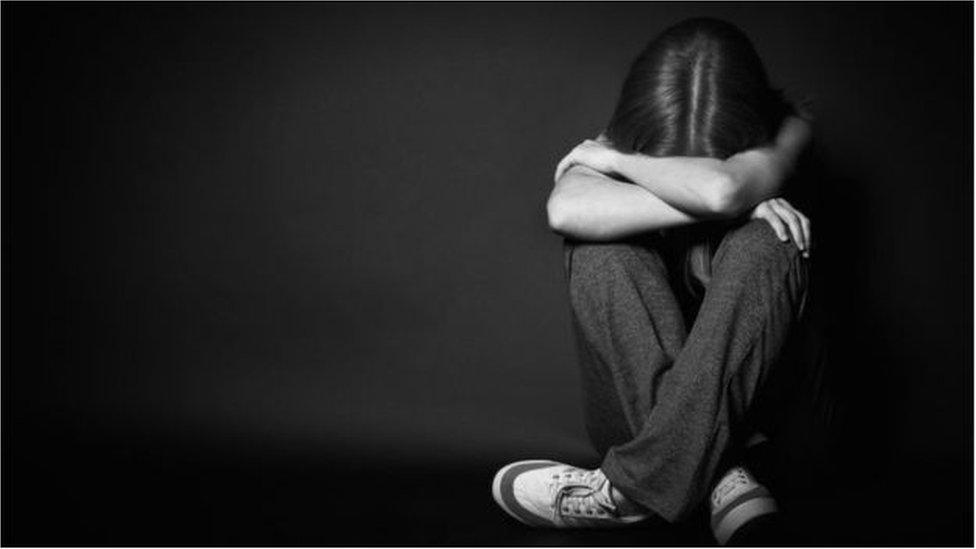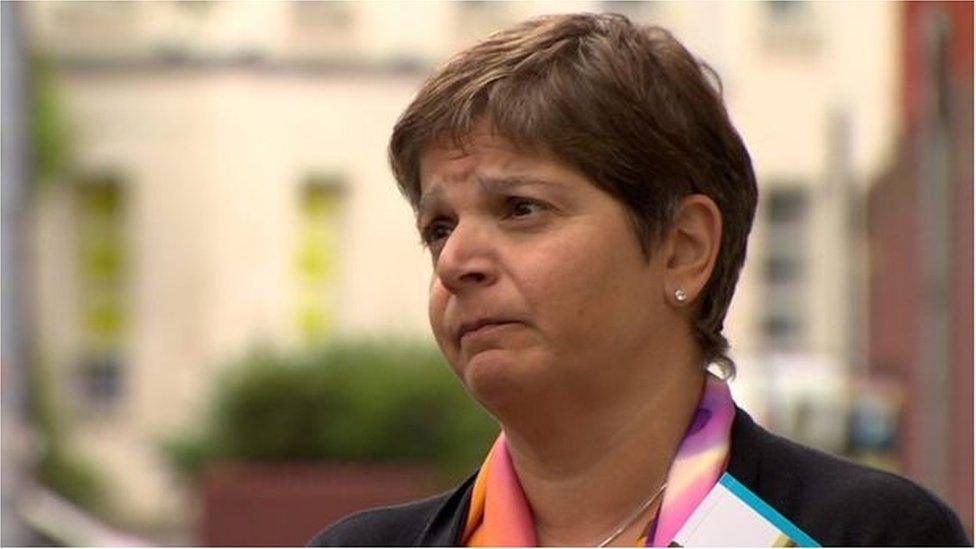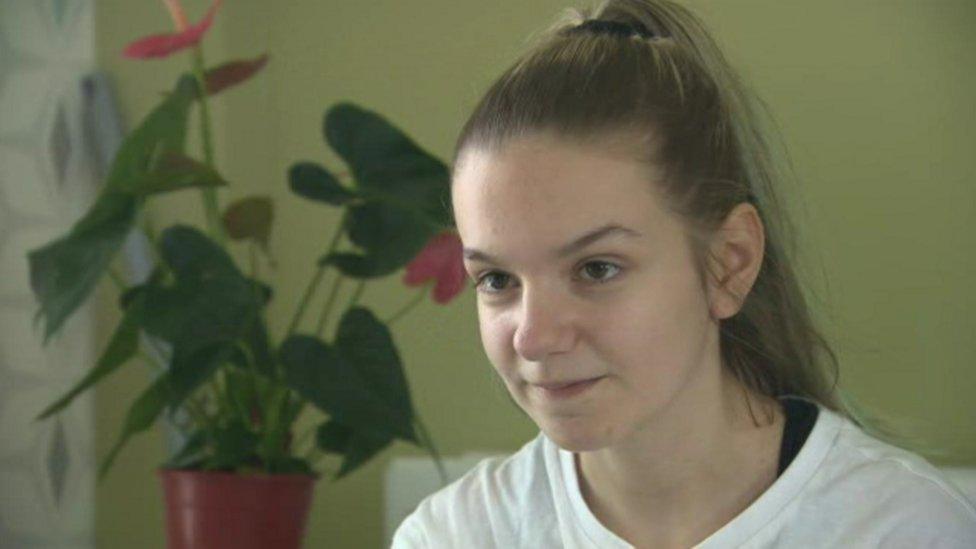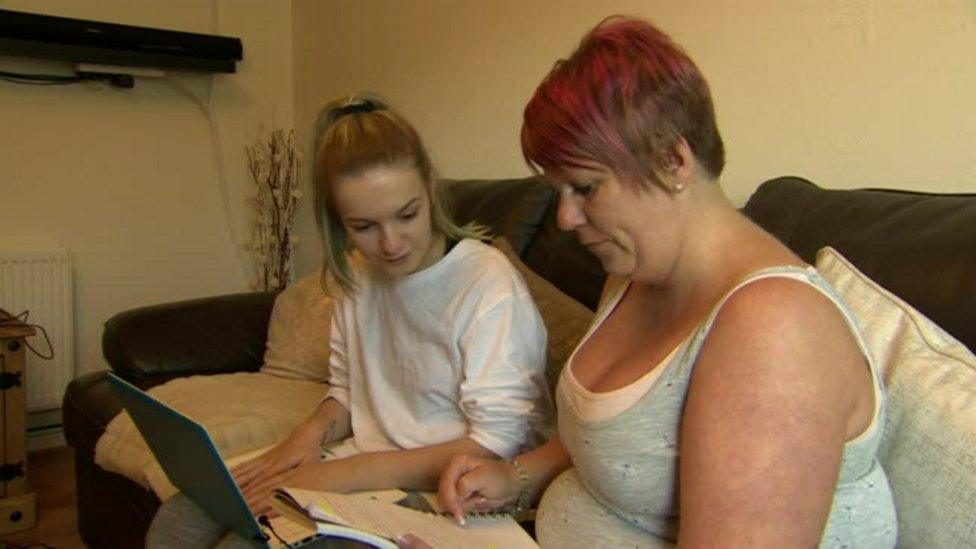Mental health: Children face struggle for services
- Published

A review by the Children's Commissioner described reform of mental health services as "glacial"
Children in Northern Ireland face a constant fight for mental health support, a review has found.
The critical report, by the children's commissioner, found a system under significant pressure and described the pace of reform as "glacial".
Commissioner Koulla Yiasouma said urgent reform is required.
The review is the first of its kind in Northern Ireland. The Department of Health said it acknowledges it "can and must do better".
Those behind the review gathered the views of about 600 people including children, young people and their carers about their experience of accessing mental health services.
The report made 50 recommendations and addressed what happens when a young person has the added problem of living with a learning disability.

Koualla Yiasouma, the Children's Commissioner, said urgent reform was needed
'System wanting'
It states that insufficient resources are only partly to blame for the pace of reform.
Ms Yiasouma said: "I have found the system wanting in areas such as lengthy waiting times and the high proportion of children not being accepted to specialist services.
"(There are also) problems with access to services for children with learning difficulties, or drug and alcohol issues, unacceptable failings in the care of children in mental health crises, and reliance on the use of medication to treat mental ill health.
"However, all these areas can be addressed if prioritised - even now without an executive."
On average, children said they were 14 when they started to look for help.
The review's title, 'Still Waiting', is designed to reflect the length of time young people wait before seeking help, and the time it takes for them to receive the right support.
Jessica's story


18-year-old Jessica Stitt said she feels young people with mental health issues are not taken seriously
Jessica Stitt, 18, lives in Bangor and describes being "passed around like a parcel" as she tried to access services for her mental health issues.
"Everything is such a mess because I am 18 now and I am an adult - it just feels like the mental health system has said goodbye.
"I don't feel that young people are listened to or taken seriously. You see the GP, then the hospital, then counsellors and you have to tell your story every time... you just keep going round in circles and getting nowhere," she added.
As a result of her learning disability, Jessica says she cannot socialise with people very well.
At one stage, things got so bad that she took an overdose.
"I just wanted to die, I didn't want to be here no one was listening to me."
According to her mum, Laverne, there is no evidence of organisations working together.
"There is no link-up. They don't pass on notes - maybe if they did they would all be on the same wavelength. Kids with a learning disability get it tough."

This is a point that is supported by the commissioner's review.
In fact, it stresses that people with a learning disability and a mental health issue have greater difficulty accessing services than other groups in society.
The report states that is partly because, in order to access mental health services, they have to show that their mental health is unrelated to their learning disability.
Timing, according to the commissioner, is a huge issue.
"Children wait to ask for help, they wait to receive the right support and we all wait for systems to catch up with how young people need that support to be provided," she said.

Jessica Stitt with her mum, Laverne, who have both criticised the support services available
To try to reform the system, the 'Stepped Care Model' was introduced by the Department of Health in 2012.
It recommends a range of psychological therapies to treat people with depression and anxiety disorders.
Gaps in collection of data
According to the review, despite the model emphasising the importance of services working together, the reality looks quite different.
It notes that the rate of change has been too slow and not sufficient to meet the growing demand and changing needs of children today.
The review also found alarming gaps in how the system collects data, including why young people are not being accepted to specialist mental health services.
It also concluded that the amount of money spent on children's mental health services is inadequate, with an outlay of £31m in Northern Ireland, representing just 0.8% of the overall health budget.
The report makes a number of recommendations including better training in mental health for GPs; fast tracking young people to services where possible via the GP; and joining up crisis response services, in particular within the emergency department setting.
The Department of Health said it welcomed the report and is "committed to delivering real and meaningful improvements".
'Limited resources'
A spokesperson said: "This is a complex and challenging area, where need is continually evolving and demand is increasing.
"Dedicated colleagues right across the system work tirelessly with limited resources to deliver high quality services.
"However, we know we can and must do better. Through our transformation programme, the department and the senior leadership team of the Health and Social Care (HSC) Board are committed to delivering real and meaningful improvements.
"Nowhere is this more important than in meeting the mental health needs of our young people.
"This report makes a key contribution to this process and we look forward to working with the commissioner going forward, and indeed with young people and their families, to make improvements and deliver better services," added the spokesperson.
The Department of Health said it was a "complex and challenging area, where need is continually evolving and demand is increasing".
"Dedicated colleagues right across the system work tirelessly with limited resources to deliver high quality services.
"However, we know we can and must do better. Through our transformation programme, the department and the senior leadership team of the HSC are committed to delivering real and meaningful improvements.
"Nowhere is this more important than in meeting the mental health needs of our young people."
- Published20 March 2018

- Published21 June 2018
